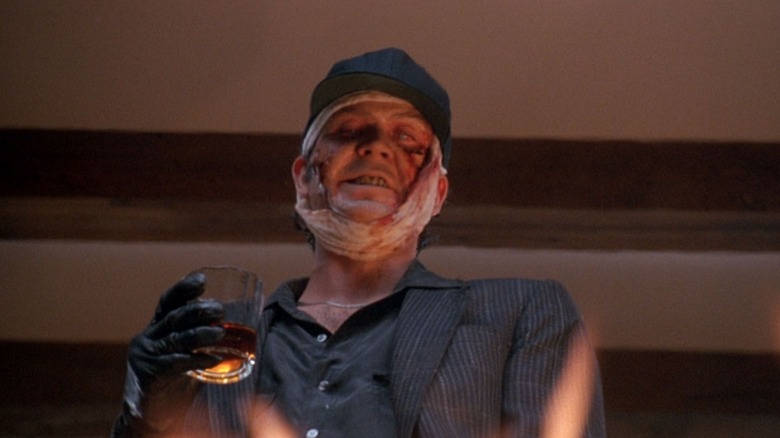Why Stephen King Wrote Under The Pseudonym Richard Bachman
After Stephen King published "Carrie" in 1973, Brian De Palma's eponymous adaptation brought it to life to stark, harrowing effect. Although King had already amassed a following by then, De Palma's film undoubtedly contributed to the novel's (and the author's) increasing popularity. After four steady years of writing compelling stories, King struck gold with "The Shining," which still remains one of the most popular stories associated with the master of horror. Infused with personal elements from King's life, "The Shining" tackles the cabin fever trope with taut mastery over suspense and pacing, where the psychological and the supernatural meet to form a riveting tale.
A year later, King savored success again with "It," which can be considered a milestone entry in the pulp horror genre that we take for granted today. This is also the juncture when King almost stopped writing more horror, as he was plagued with self doubt and considered himself "not much of a writer" but "a hell of an elaborator" (via TIME). These sentiments do not reflect objective truth, of course, but every creative has second-guessed their talent at some point, with King being no exception. This spell of self-doubt (thankfully) did not last long, but King wanted to prove to himself that he still had the juice. What better way to gauge people's authentic reactions to one's craft than to write under a pseudonym?
Richard Bachman was the name King chose to write under, which he used to pen many stories, including the highly controversial "Rage" and the dystopian thriller "The Running Man" (which got a loose video game adaptation for Commodore 64, for some reason). However, King's link to Bachman was outed in 1985 by one Steve Brown, a bookstore clerk who clocked the similarities between King and Bachman's writing styles. There's much more to this pseudonym story, so let's take a look at the details.
Stephen King used the Bachman pseudonym to publish more books
After King was outed as Bachman, the author confirmed that he was indeed using this faux identity and clarified some details on his official website. King explained that the publishing industry at the time had an unspoken rule about releasing one book per year, operating under the assumption that the general public wouldn't be open to two or more releases from the same author. King acknowledges that it isn't strictly true, citing mainstream genre writers like Danielle Steel, who "usually publishe[d] two books a year." However, to circumvent this perceived issue, King chose the Bachman pseudonym on a whim during a phone call. This is what he had to say about it:
"I adopted Richard Bachman and that was what made it possible for me to do two books in one year [...] The name Richard Bachman actually came from when they [the publishers] called me and said 'we're ready to go to press with this novel, what name shall we put on it?' [...] there was a novel by Richard Stark on my desk so I used the name Richard and that's kind of funny because Richard Stark is in itself a pen name for Donald Westlake, and what was playing on the record player was 'You Ain't Seen Nothin' Yet' by Bachman Turner Overdrive, so I put the two of them together and came up with Richard Bachman."
Before King was identified as Bachman, he juggled these dual identities to pen more books: "The Long Walk" came after "The Stand," "Roadwork" was written after "Firestarter" and so on. To make the Bachman books appear distinct, King cooked up some biographical details about the author, who apparently served in the Coast Guard and the Merchant Marine for years, eventually settling in New Hampshire as a dairy farmer. Minute details were added to make this person seem real, such as the accidental death of Bachman's child (!) and health complications that the author experienced. Once King and Bachman were proven to be one and the same, a final fact was added to the latter's biography: Bachman's death due to "cancer of the pseudonym."
Although King's Bachman stint was relatively short-lived, it is an integral aspect of King's authorial journey as it allowed him to write without the added pressure of public expectations. In case you want to read something fun about the King-Bachman connection, I recommend reading King's "The Dark Half," which takes a fictional approach to this identity split and situates it within a horror premise. Good stuff.

